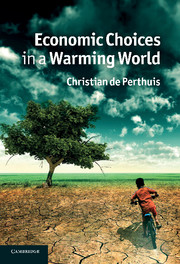Book contents
- Frontmatter
- Contents
- Acknowledgements
- Introduction
- 1 Climate risk
- 2 Some like it hot: adaptation to climate change
- 3 Building a low-carbon energy future
- 4 Pricing carbon: the economics of cap-and-trade
- 5 Intensifying agriculture to safeguard forests
- 6 The price of carbon: the economics of projects
- 7 Macroeconomic impacts: sharing carbon rent
- 8 International climate negotiations
- Conclusion
- References
- Appendix 1 Thirty key readings
- Appendix 2 Thirty key sets of figures
- Appendix 3 Greenhouse gas emissions around the world
- Glossary
- Index
Appendix 1 - Thirty key readings
Published online by Cambridge University Press: 05 June 2012
- Frontmatter
- Contents
- Acknowledgements
- Introduction
- 1 Climate risk
- 2 Some like it hot: adaptation to climate change
- 3 Building a low-carbon energy future
- 4 Pricing carbon: the economics of cap-and-trade
- 5 Intensifying agriculture to safeguard forests
- 6 The price of carbon: the economics of projects
- 7 Macroeconomic impacts: sharing carbon rent
- 8 International climate negotiations
- Conclusion
- References
- Appendix 1 Thirty key readings
- Appendix 2 Thirty key sets of figures
- Appendix 3 Greenhouse gas emissions around the world
- Glossary
- Index
Summary
1. Agrawala, S. and Fankhauser, S. (2008) Economic Aspects of Adaptation to Climate Change: Costs, Benefits and Policy. Paris: OECD. Available at: www.oecd.org/env/cc/adaptationeco.
The authors emphasize the fragmentary nature of knowledge about the cost of adaptation policies to climate change. They warn about the unreliability of regularly used figures and suggest ways of improving economic instruments.
2. Aldy, J. E. and Stavins, R. N. (2009) Post-Kyoto International Climate Policy: Implementing Architectures for Agreement. Cambridge: Cambridge University Press.
Arising initially from a seminar held at Harvard in the spring of 2006, the second edition of this collective work has been considerably expanded. The editor sensibly provides a short version of what has become a standard reference work in American universities.
3. Bellassen, V. and Leguet, Benoît (2008) Comprendre la compensation carbone. Paris: Pearson.
Well-known as specialists in the field of carbon offsets, Valentin Bellassen and Benoît Leguet provide a very helpful guide to the economics of emissions reduction. For the first time, the rules of the Kyoto Protocol are explained in simple and straightforward language.
4. Broecker, Wallace S. and Kunzig, Robert (2008) Fixing Climate: What Past Climate Changes Reveal about the Current Threat – and How to Counter it. New York: Hill and Wang.
Wallace Broecker was one of the first scientists to reconstruct the history of past climates. With the journalist Robert Kunzig, he provides a new view on climate risks and how to reduce them. An acerbic interpretation.
5. Chevalier, J-M. (2009) The New Energy Crisis. Basingstoke: Palgrave Macmillan. (Originally published in French under the title Les nouveaux défis de l'énergie, Economica, 2009).
[…]
- Type
- Chapter
- Information
- Economic Choices in a Warming World , pp. 225 - 230Publisher: Cambridge University PressPrint publication year: 2011



